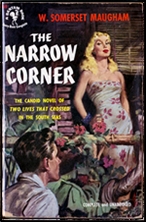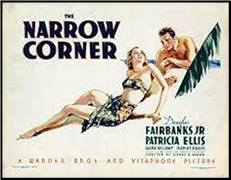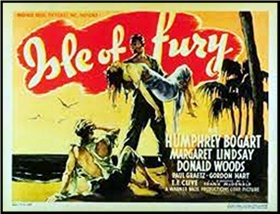Fri 7 May 2021
A Book! Movie!! Movie!!! Review by Dan Stumpf: W. SOMERSET MAUGHAM – The Narrow Corner // Film (1933) // ISLE OF FURY (1936).
Posted by Steve under Films: Drama/Romance , Reviews[6] Comments

â— W. SOMERSET MAUGHAM – The Narrow Corner. William Heinemann Ltd., UK, hardcover, 1932.
â— THE NARROW CORNER. Warners, 1933. Douglas Fairbanks Jr, Patricia Ellis, Ralph Bellamy, Dudley Digges, Artur Hohl, Reginald Owen, Willie Fung, and Sidney Toler. Screenplay by Robert Presnell. Directed by Alfred E. Green.
â— ISLE OF FURY. Warners, 1936. Humphrey Bogart, Margaret Lindsay, Donald Woods, E.E. Clive, Paul Graetz, George Regas, Tetsu Komai, Miki Morita, and Frank Lackteen. Screenplay by Robert Hardy Andrews and William Jacobs. Directed by Frank McDonald.
The Narrow Corner finds Maugham striding confidently through Joseph Conrad territory, with a Marlow-like narrator recalling his encounter with a young wastrel out cruising the south seas to evade a murder rap in Australia. With the ship laid up for repairs on a remote island, the young man meets a family of simple, decent Dutch traders and finds love (or does he?) when it’s too late (or is it?)

Maugham does a splendid job with the locations, the simple plot and the complex characterizations, but it sometimes seems he’s trying too hard to write a Serious Novel when he could be telling a Good Story. I should also add, in case you’re bothered by it, that this is the homosexiest straight novel I’ve seen in some time: the women are generally predatory or self-absorbed, and Maugham spends a lot of time contrasting the physical beauty and innocence of the young men with the saggy, baggy dissipation of their elders.
Despite the subtext, The Narrow Corner was snapped up by Warners and filmed just a year after publication. In those heady, pre-code days, Hollywood could still exploit the steamy exoticism of the thing, and director Alfred E. Green and writer Robert Presnell did rather well by it, Presnell excising Maugham’s pretensions, and Green slapping the story on screen with pace and style.

Corner offers one of the best storm-at-sea scenes ever in the Movies, plus a cast of able thespians (including Doug Fairbanks Jr. as the wastrel, Patricia Ellis as the love-starved island girl, Dudley Digges and Arthur Hohl as dope-addict doctor and crooked captain, and Sidney Toler as a tough “fixer.â€) delivering some sharp lines. The film falls down only in the casting of Ralph Bellamy, the mere appearance of whom gives away the ending immediately.
A few years later, Warners went to the well again, and to their credit, they made an enjoyable “B†picture out of the thing. True, they tossed out most of Maugham’s novel (He got screen credit anyway, which he may or may not have welcomed.) but they filled it up with crackerjack ideas of their own invention: shifty natives planning robbery and fomenting unrest; a larcenous skipper prone to murder; undersea mayhem, and even a hokey octopus!

Humphrey Bogart, sporting an unflattering mustache, stars as a husband balanced precariously on the edge of cuckoldry when mysterious castaway Donald Woods turns up on his remote tropical island. Wise old Doctor E.E. Clive is quick to intuit the attraction between Woods and Bogey’s bride (lovely Margaret Lindsay, whose star burned steadily in Hollywood but somehow never caught fire) but writers Andrews and Jacobs cut away to the action scenes before things get too syrupy.
They also do a good job of fleshing out the characters to more than B-movie dimensions. Director McDonald lets his actors expand to fit the parts, as his camera moves gracefully through the studio tropics. As for Bogart, well, this was the point in his career when Warners was still wondering what to do with him, the years he spent playing second-leads, vampires and Mexican bandits. He looks a bit as if at any moment the writers might decide to kill off his character, and the uncertainty works well in this context. It’s not Maugham’s novel, but it’s a dandy bit of entertainment in the Warners style.

May 7th, 2021 at 7:38 pm
Dan,
My feelings exactly about novel and both films, all worth the effort if not exactly literature or art. Maugham did a fairly steady stream of South Sea Island and Mysterious East fiction from THE LETTER to MOON AND SIXPENCE and THE RAZOR’S EDGE (Tibet), and no few good shorts using the setting, but commerce did tend to outweigh art despite his literary reputation.
He isn’t as read as he once was, or his shorts and recognized as they were, but it hasn’t been all that long since THE PAINTED VEIL and UNDER THE TUSCAN SUN were on the big screen, and you never know when someone is going to see potential in one of his many books and stories again.
As for homoerotic content, well, in Maugham’s case it is to be expected though it is more pronounced here. It is somewhat ironic that so many of the magazines running his fiction never seemed to notice despite his creating some of the most memorable bad women behaving badly in fiction.
May 7th, 2021 at 8:48 pm
Maugham is an author I’ve never read, not even ASHENDEN (which is not a novel but a collection of short stories), but when I recently learned that authors such as Ian Fleming and Stephen King have paid literary tributes to him, I thought to myself that maybe it’s not too late.
May 7th, 2021 at 9:19 pm
You’ll probably enjoy ‘Ashenden’ very much; what with the savory backstory of Maugham’s own affiliation with the business. That collection of stories really stick with one.
His prose is supple and effortless reading, I never found him rambling or undisciplined. If he ever was, I did not notice it besides his many other merits.
When he details a character for the reader, it is embossed or burnished on the memory (if I can use a couple $5 words myself).
The big, meaty, final chapter of ‘Ashenden’ is staggeringly good, at least I found it so. It was like sitting in the same room with the two characters.
Wonderful immersive prose for frosty evenings; in Maugham there’s a lot of things like brandy, cigars, veal cutlets, teakettles, robes, bathtubs and whatnot.
May 7th, 2021 at 9:48 pm
ASHENDEN is a masterpiece and highly influential on both Ambler and Graham Greene. As for Maugham the spy, had his boat reached Russia a week earlier there are historians who think he might very well have changed the history of the Russian Revolution.
THE MAGICIAN is interesting too, Maugham’s Oliver Haddo based on Alister Crowley. It was a memorable silent film too.
May 7th, 2021 at 11:37 pm
If there’s an ‘Ashenden’ review on MysteryFile I hope someone sorts out the farcical runaround of the adaptations I can’t keep straight. Gielgud starred in Hitchcock’s ‘Secret Agent’? But it was material adapted from ‘Ashenden’? Meanwhile, Conrad’s ‘Secret Agent’, Hitchcock filmed as, ‘Sabotage’? Ulp
May 8th, 2021 at 7:30 am
Back in 1989 I discovered Somerset Maugham’s novelets about the south seas and far east and enjoyed them so much that I’m presently rereading them again in 2021. I’ve recently read The Narrow Corner and enjoyed it also. I can recommend Cakes and Ale, The Moon and Sixpence, and Of Human Bondage, all of which have strong autobiographical elements.
I’ve also read a couple big biographies about Maugham, who at one time was one of the world’s most popular authors. He was very successful writing plays in his early career and his novelets were often published in Cosmopolitan in the twenties and thirties. The editor, Ray Long, loved his work. He was paid thousands of dollars for each one, which was a very large amount back then. He even received a dollar a word.
Though he had homosexual love affairs, he also had affairs with women and even was married for several years and had a daughter. He was a great collector of original art also.